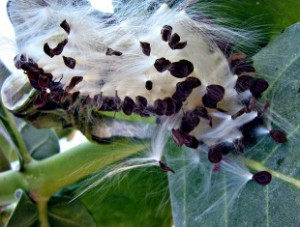New insulating material from invasive ‘Apple of Sodom’
PIC CAP: The fibers and seed pod of Calotropis procera. Commonly known as the Apple of Sodom, this shrub can grow up to 5 meters high.
The Apple of Sodom (Calotropis procera) plant is often regarded as a nuisance, but thanks to researchers in Saudi Arabia it could now be the source of a novel insulating material. Dr Mohamed Ali from King Saud University received a gold medal for his work.
From regulating temperature in walls, pipes and electrical devices to dampening sound, insulating materials play an important part in our daily lives. But how can they be made from a plant like C. procera and what are the advantages over traditional insulation materials such as foam or mineral wool?
Lead researcher Dr Mohamed Ali explained: “This plant tends to grow in very dry areas. It grows naturally all around as a weed and animals can’t eat it, so it doesn’t have that many uses.” Unlike other natural insulating materials, such as wood fibre (also used for paper, tissue, cardboard etc.) or mineral wool (also used in plastics and the automotive industry), this means that there is no competition with other sectors or livelihoods.
“What interested me about it were the seedpods. Inside there are lots of white fibres attached to the seeds – I collected these fibres and did some experimenting.”
To make the insulator, Dr Ali and his colleagues combined the plant’s fibres with a binding resin called phenolic formaldehyde, and compressed it to a thickness of around 2 cm. The resulting material was a stiff board with good insulating properties.
They then discovered that the finished product was just as good if natural corn starch was used in place of phenolic formaldehyde, resulting in a natural, eco-friendly material that would be cheap to produce and completely safe to use in houses.
M. Ali said that the invention was ‘very promising’ and that he hoped to commercialise in the near future. “It already meets industry specificationsÉwe compared its thermal conductivity to other materials such as rock wool, and found it was very close.”
He is currently working on making it fire resistant and investigating the possibility of making a tube-shaped version that could be used as pipe insulation.
*Dr Ali would like to acknowledge: Prof. Abdullah Al-Othman, the Rector of King Saud University, Prof. Ali Al-Ghamdi, Vice Rector for Graduate Studies and Scientific Research for their guidance and encouragement towards building a knowledge-based economy needed for a productive and fruitful society.
He would also like to thank Dr. Naif Alajlan, Director of the Innovation Center for giving him the opportunity to present at the British Innovation Show 2011. Thanks is also extended to Prof. Khalid Alhumaizi, the Dean of the Engineering College for his encouragement to do more research.
This project is supported by the National plan for Sciences and technology supported by the King Saud University and King Abdulazeez City for Science and Technology. Dr. Obida Zietoun is a co-investigator on this project.




